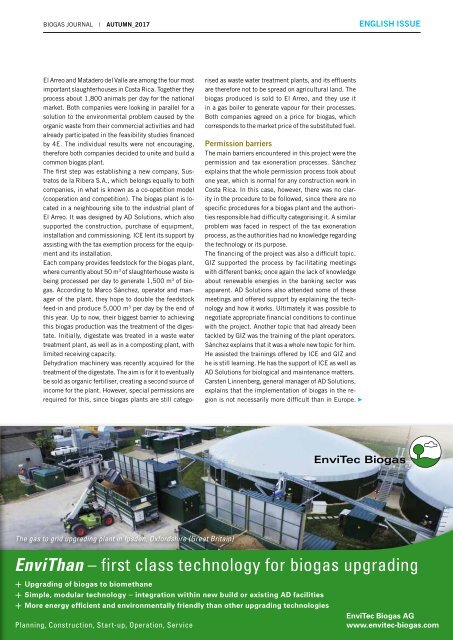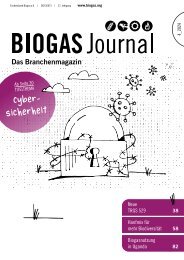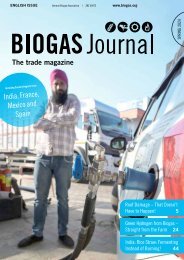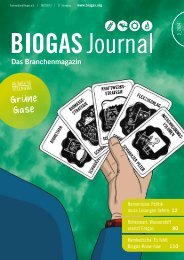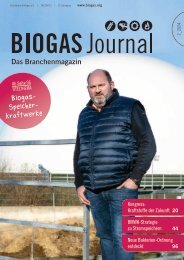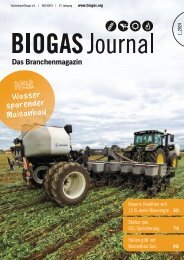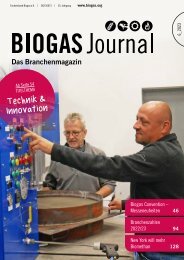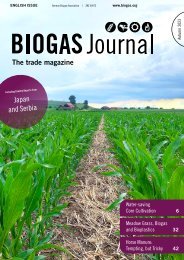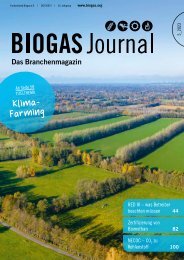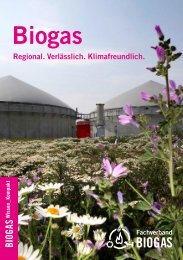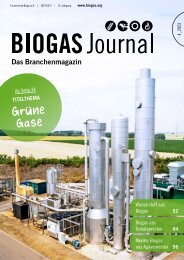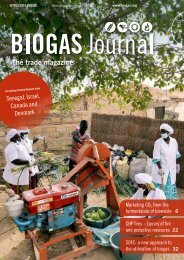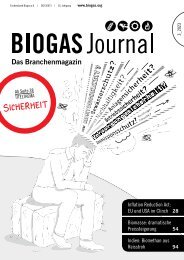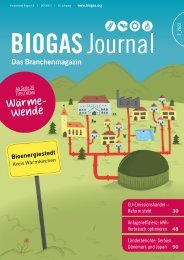Create successful ePaper yourself
Turn your PDF publications into a flip-book with our unique Google optimized e-Paper software.
Biogas Journal | <strong>Autumn</strong>_<strong>2017</strong> English Issue<br />
El Arreo and Matadero del Valle are among the four most<br />
important slaughterhouses in Costa Rica. Together they<br />
process about 1,800 animals per day for the national<br />
market. Both companies were looking in parallel for a<br />
solution to the environmental problem caused by the<br />
organic waste from their commercial activities and had<br />
already participated in the feasibility studies financed<br />
by 4E. The individual results were not encouraging,<br />
therefore both companies decided to unite and build a<br />
common biogas plant.<br />
The first step was establishing a new company, Sustratos<br />
de la Ribera S.A., which belongs equally to both<br />
companies, in what is known as a co-opetition model<br />
(cooperation and competition). The biogas plant is located<br />
in a neighbouring site to the industrial plant of<br />
El Arreo. It was designed by AD Solutions, which also<br />
supported the construction, purchase of equipment,<br />
installation and commissioning. ICE lent its support by<br />
assisting with the tax exemption process for the equipment<br />
and its installation.<br />
Each company provides feedstock for the biogas plant,<br />
where currently about 50 m 3 of slaughterhouse waste is<br />
being processed per day to generate 1,500 m 3 of biogas.<br />
According to Marco Sánchez, operator and manager<br />
of the plant, they hope to double the feedstock<br />
feed-in and produce 5,000 m 3 per day by the end of<br />
this year. Up to now, their biggest barrier to achieving<br />
this biogas production was the treatment of the digestate.<br />
Initially, digestate was treated in a waste water<br />
treatment plant, as well as in a composting plant, with<br />
limited receiving capacity.<br />
Dehydration machinery was recently acquired for the<br />
treatment of the digestate. The aim is for it to eventually<br />
be sold as organic fertiliser, creating a second source of<br />
income for the plant. However, special permissions are<br />
required for this, since biogas plants are still categorised<br />
as waste water treatment plants, and its effluents<br />
are therefore not to be spread on agricultural land. The<br />
biogas produced is sold to El Arreo, and they use it<br />
in a gas boiler to generate vapour for their processes.<br />
Both companies agreed on a price for biogas, which<br />
corresponds to the market price of the substituted fuel.<br />
Permission barriers<br />
The main barriers encountered in this project were the<br />
permission and tax exoneration processes. Sánchez<br />
explains that the whole permission process took about<br />
one year, which is normal for any construction work in<br />
Costa Rica. In this case, however, there was no clarity<br />
in the procedure to be followed, since there are no<br />
specific procedures for a biogas plant and the authorities<br />
responsible had difficulty categorising it. A similar<br />
problem was faced in respect of the tax exoneration<br />
process, as the authorities had no knowledge regarding<br />
the technology or its purpose.<br />
The financing of the project was also a difficult topic.<br />
GIZ supported the process by facilitating meetings<br />
with different banks; once again the lack of knowledge<br />
about renewable energies in the banking sector was<br />
apparent. AD Solutions also attended some of these<br />
meetings and offered support by explaining the technology<br />
and how it works. Ultimately it was possible to<br />
negotiate appropriate financial conditions to continue<br />
with the project. Another topic that had already been<br />
tackled by GIZ was the training of the plant operators.<br />
Sánchez explains that it was a whole new topic for him.<br />
He assisted the trainings offered by ICE and GIZ and<br />
he is still learning. He has the support of ICE as well as<br />
AD Solutions for biological and maintenance matters.<br />
Carsten Linnenberg, general manager of AD Solutions,<br />
explains that the implementation of biogas in the region<br />
is not necessarily more difficult than in Europe.<br />
The gas to grid upgrading plant in Ipsden, Oxfordshire (Great Britain)<br />
EnviThan – first class technology for biogas upgrading<br />
+ Upgrading of biogas to biomethane<br />
+ Simple, modular technology – integration within new build or existing AD facilities<br />
+ More energy efficient and environmentally friendly than other upgrading technologies<br />
Planning, Construction, Start-up, Operation, Service<br />
EnviTec Biogas AG49<br />
www.envitec-biogas.com


